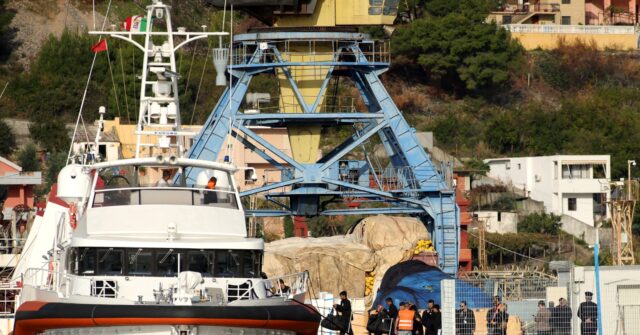A constitutional conflict has emerged in Italy as judges have negated a crucial aspect of Prime Minister Giorgia Meloni’s plan to establish migrant detention centers in Albania, ordering the return of migrants back to Italy. The Italian judiciary intervened to bring 12 migrants—ten from Bangladesh and two from Egypt—back, based on their assessment that the migrants could not be deported to their home countries, as these nations are deemed unsafe. This ruling has raised serious concerns regarding the feasibility of the Albanian migrant scheme, which other European nations and officials in Brussels have been observing as a potential solution for managing illegal immigration to the continent.
Under Meloni’s plan, illegals would initially be directed to detention centers in Albania for their asylum claims to be processed offshore, avoiding their presence in Italy during this interim period. The first group of 16 migrants had already been sent to these detention facilities earlier that week, which fall under Italian jurisdiction. As part of this initiative, the Italian government had categorized 22 nations as safe for potential deportation, including Bangladesh and Egypt. However, the court ruling has highlighted the inadequacies of labeling these countries as “safe,” referencing a previous European Court of Justice ruling that determined nations outside the EU must be entirely free from risks like persecution and violence to be considered safe.
In response to the ruling, the conservative government has expressed significant discontent, claiming it undermines the authority of elected officials in determining the nation’s immigration policies. Prime Minister Meloni announced that she will convene a council of ministers to address the issue, arguing that the judiciary should not dictate which countries can be classified as safe for deportation. This sentiment was echoed by Deputy PM Matteo Salvini, who condemned the court’s decision as an attack on Italy, accusing a portion of the judiciary of politicization and suggesting that obstruction of border defense jeopardizes national security.
The discord between the government and the judiciary has sparked broader commentary from various members of the ruling coalition. Deputy PM Antonio Tajani emphasized the importance of respecting decisions made by the legislative and executive branches while reminding stakeholders that a democratic system relies on the separation of powers. He articulated that judicial decisions should not alter laws or impede the executive branch’s ability to fulfill its duties, highlighting a fundamental principle that the will of the populace, as expressed through elections, should guide governmental action.
Amidst the turmoil, Justice Minister Nordio challenged the broad interpretation of what constitutes an unsafe country, pointing out that if such a standard were applied rigorously, countries with serious legal issues—including the death penalty—might also be categorized as unsafe. This perspective illustrates the complexities and potential pitfalls of immigration policy and legal definitions, as many countries with contentious human rights records could be deemed unfit under stringent scrutiny.
The implications of this ruling are significant as they could derail the Albanian migrant detention scheme and set a precedent for future immigration policies in Italy and across Europe. The friction between judicial review and governmental policy-making raises crucial questions about the balance of power and the role of the judiciary in democratic societies. As the government grapples with its next steps, examples from the ongoing situation could shape the discourse around immigration and national sovereignty not only in Italy but in the broader European context, where similar challenges surrounding migration and asylum processing are being faced.

